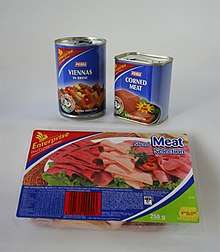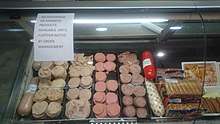2017–18 South African listeriosis outbreak
| 2017–18 South Africa listeriosis outbreak | |
|---|---|
 The outbreak was from processed meats produced by Enterprise Foods in Polokwane | |
| Location | South Africa |
| Date | 2017 – March 2018 |
| Deaths | 200 [1] |
Non-fatal injuries | 1000 confirmed cases |
The 2017–18 South African listeriosis outbreak is an ongoing widespread outbreak of Listeria monocytogenes food poisoning that resulted from contaminated processed meats produced by Enterprise Foods, a subsidiary of Tiger Brands,[2] in Polokwane. As of 12 March 2018, there have been 183 deaths and 973 confirmed infections.[3] It is the world's worst ever listeriosis outbreak.[1]
Investigation of the origin
The outbreak was first identified by doctors at Chris Hani and Steve Biko academic hospitals in July 2017, who notified the National Institute for Communicable Diseases (NICD) about an unusually high number of neonatal infections.[4][5]
Interviews conducted by the authorities with people who contracted listeriosis indicated that processed cold meats, most notably polony, was the likely cause of the outbreak. However source of the outbreak at the Enterprise Foods facility was only discovered after nine five year old children from Soweto were brought to Chris Hani Baragwanath Hospital in mid-January 2018. Samples taken from Enterprise and Rainbow Chicken polony products at the crèche the children attended tested positive for the strain of listeriosis causing the outbreak and led investigators to the infected production facilities.[6]
On March 4 2018, Health Minister Aaron Motsoaledi announced that the disease was traced to the Enterprise processed meats factory in Polokwane. Environmental samples from the factory were found to contain the bacterium Listeria monocytogenes strain ST 6, the strain responsible for the outbreak. [1] Additionally, further samples from another Enterprise factory in Germiston and from a Rainbow Chicken factory in the Free State tested positive for Listeria, although which strain these samples tested positive for is not yet known.[7]
Impact

In January 2017 the first laboratory confirmed cases of the outbreak had been made. By December 2017 the outbreak had been declared by the South African Ministry of Health, stating that the ministry was “very concerned” by the outbreak.[8] By mid-January 2018 around 557 cases had been confirmed with most incidences recorded in the Gauteng Province.[9]
By 24 February 2018 the outbreak had caused the deaths of 164 people and infected a further 872 people.[8] By 5 March 2018 a total of 180 people were thought to have died from the outbreak[10] with 78 of the deaths being infants.[11]
Reactions after cause was known
Following the announcement, Tiger Brand's stock price on the Johannesburg Stock Exchange dropped by 7%, resulting in a R5.7bn (equivalent to 438.69 million USD) reduction in total value.[10] At a press conference the next day, Tiger Brands CEO Lawrence MacDougall denied responsibility, stating "There is no direct link between any of the deaths and our products." When pressed by journalists, he refused to apologize. [12]
The South African government issued a recall notice of all products of RCL Foods Limited and Enterprise Foods and Rainbow Chicken facilities on March 4.[13][14] Tiger Brands reportedly admitted to knowing about the presence of listeriosis in some of its products eighteen days before the government recall.[6]
On March 5, Botswana, Namibia, Mauritius, Mozambique, Malawi and Zambia suspended all imports of processed meat from South Africa.[15][16] Kenya followed suit on the next day. [17]
References
- 1 2 3 Child, Katherine (4 March 2018). "Enterprise polony identified as source of listeria outbreak". Times Live. Retrieved 4 March 2018.
- ↑ de Wet, Phillip (4 March 2018). "Tiger Brands' R2.2 billion processed meat business catches fire as listeriosis is traced to its Polokwane facility". Business Insider South Africa. Retrieved 6 March 2018.
- ↑ Shaffer, Erica (22 March 2018). "Tiger Brands faces lawsuit over S. Africa Listeria outbreak". MEAT+POULTRY. Retrieved 22 March 2018.
- ↑ "Media statement by the Minister of Health Dr Aaron Motsoaledi on the outbreak of a food borne disease in South Africa" (PDF) (Press release). Department of Health. 5 December 2017.
- ↑ Shange, Naledi (5 December 2017). "Listeriosis: 10 things we know so far". Times Live. Retrieved 6 March 2018.
- 1 2 de Wet, Phillip (4 March 2018). "How the deadly strain of listeriosis was traced to Tiger Brands' Enterprise polony factory". www.businessinsider.co.za. Retrieved 2018-03-07.
- ↑ Petersen, Tammy (4 March 2018). "Listeriosis outbreak traced to Enterprise facility in Polokwane". News24. Retrieved 6 March 2018.
- 1 2 Simelane, Bheki C. (21 February 2018). "Listeriosis: Crisis as death toll rises". Daily Maverick. Retrieved 5 March 2018.
- ↑ McCarthy, Kerrigan (15 January 2018). "Spike in Listeria infections in South Africa: why it matters". The M&G Online. Retrieved 5 March 2018.
- 1 2 "Tiger Brands, RCL Foods lost R5.7 billion in one day after #ListeriosisOutbreak". IOL Business Report. 5 March 2018.
- ↑ "#Listeriosis: 78 of killer disease deaths were infants". IOL News. Retrieved 2018-03-06.
- ↑ Davis, Rebecca (2018-03-05). "Listeriosis outbreak: The blame games begin". Daily Maverick. Retrieved 2018-03-07.
- ↑ "South Africa traces deadly listeria to sausage meat, issues recall". Reuters. 4 March 2018. Retrieved 7 March 2018.
- ↑ "Tons of recalled meat is headed for public landfill sites – and that could spell an entirely new disaster". www.businessinsider.co.za. Retrieved 2018-03-07.
- ↑ "Malawi shops urged to remove South Africa meat products". Reuters. 6 March 2018.
- ↑ "Namibia, Malawi pull SA meat products off shelves". Eyewitness News. 5 March 2018. Retrieved 6 March 2018.
- ↑ Orinde, Hillary. "Kenya bans South Africa meat as WHO declares listeriosis outbreak 'largest ever'". The Standard. Retrieved 2018-03-07.